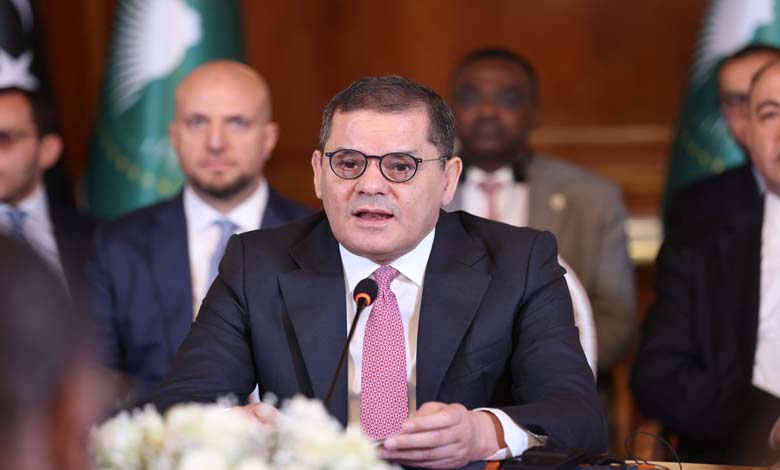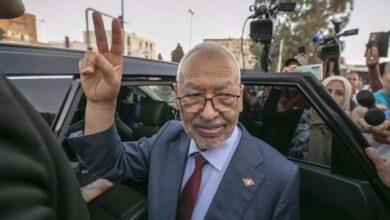Dbeibah Sidesteps Resignation Calls by Proposing Direct Elections

Aguila Saleh rejects Dbeibah’s maneuvers, calling on local and international actors to support efforts to form a unified national government and warning that delays could lead to chaos and threaten the country’s unity.
-
How Dbeibah Planned to Eliminate His Former Ally “Gheniwa” – A BBC-Affiliated Report Reveals
-
Dbeibah defends decisions to neutralize armed groups despite rising violence
In a move widely interpreted as an attempt to bypass growing public and political demands for his resignation, Libyan Prime Minister of the Government of National Unity, Abdulhamid Dbeibah, called for direct elections, rejecting what he described as the creation of new transitional phases. His call comes amid a wave of public protests and increasing pressure from the House of Representatives, led by Aguila Saleh, urging the swift formation of a new government to oversee the long-awaited elections.
Although Dbeibah’s speech before members of the High Council of State in Tripoli carried messages of reassurance regarding the importance of institutional unification and strengthening the role of the military and police, the timing—amid renewed clashes in the capital and growing demands for his departure—raises questions about his true intentions.
-
Gheniwa’s Blood Strangles Dbeibah… Tripoli’s Nero Burns in His Own Fire
-
Protests in Tripoli Call for Dbeibah and His Government to Step Down
He emphasized the government’s ongoing efforts to “eliminate armed groups outside state authority and enhance the role of official army and police institutions in ensuring security and stability,” stressing the “need for coordinated efforts among political and security institutions to consolidate state authority and meet citizens’ aspirations for stability and justice.”
Dbeibah asserted that his political vision is based on “ending transitional phases by heading directly to elections,” warning against the “illegitimate extension” of institutions through new transitional arrangements. He also implicitly accused the House of Representatives of intentionally obstructing the electoral process, suggesting that “a public referendum is the appropriate tool to break this deadlock.”
-
Washington Backs Al-Kabir in Dispute with Dbeibah, Warns Against His Replacement
-
Financial Strangulation and Stalled Dialogue with Haftar Threaten Dbeibah’s Government Continuity
However, Dbeibah’s opponents—both political forces in the east and protesters in the west—see his remarks as another attempt to cling to power, particularly since his government, formed after the UN-sponsored Libyan Political Dialogue Forum, has exceeded its mandate.
Tripoli has recently witnessed a new wave of angry demonstrations calling for the dismissal of Dbeibah’s government, accusing it of failing to ensure security and exacerbating economic and living conditions. Armed clashes also broke out between government forces and local militias, highlighting the fragile security situation.
-
Mohammed el-Menfi intensifies pressure on Dbeibah by criticizing spending file
-
Failure of Inter-Libyan Dialog Meeting Sparks War of Words between Dbeibah and Bachaga
Protesters accuse the government of failing to fulfill its promise to hold elections and exploiting the political divide to remain in power, calling for the formation of a neutral transitional government to oversee genuine parliamentary and presidential elections.
In contrast, Speaker Aguila Saleh stressed during a parliamentary session in Benghazi the urgency of forming a unified national government. He affirmed that the House of Representatives had finalized electoral laws in coordination with the High Council of State and opened candidacy to all without exclusion, aiming to thwart Dbeibah’s maneuvers.
-
Dbeibah after the Blinken meeting : Libya mercenaries must leave
-
Head of Egyptian Intelligence in Tripoli and supplies for al-Dbeibah visit
Saleh warned that any delay in forming the new government could “lead the country into chaos and threaten its unity,” urging both local and international stakeholders to support these efforts and reject calls to maintain the status quo.
He added that a joint committee from both chambers has already begun reviewing candidate files for the new prime minister, whose core mission will be to organize and supervise elections.
-
Salvation Friday: Libyans Hold Their Breath Amid Fears of Militia Chaos
-
Libyan Expert: Dbeibeh’s Move Is Too Late… Militias Have Become Partners in Power
Libya remains politically divided between two parallel governments: the UN-recognized Government of National Unity in Tripoli led by Dbeibah, controlling the west, and the eastern-based government appointed by the parliament in Benghazi, led by Osama Hammad and supported by Field Marshal Khalifa Haftar’s Libyan National Army, governing the east and parts of the south.
The electoral process, once seen as a path to national unity, has instead become a tool of rivalry. While Dbeibah insists that his government is the only legitimate authority to oversee elections, the parliament maintains that the current executive has lost its legitimacy and that forming a new government is essential for fair and transparent elections.
-
Where is Western Libya Heading? Open Scenarios for the Future of the Conflict
-
Militia Arms Chaos Reignites Violence Spiral in Tripoli
Amid this deadlock, Libyans’ hopes of finally holding elections to end the prolonged transitional period since 2011 are increasingly dashed by recurring political and security hurdles. Observers fear that the dispute over electoral legitimacy could become a pretext for indefinite postponement or push the country toward uncontrollable political and military escalation.
Dbeibah’s call for direct elections, despite its reformist façade, lacks a clear implementation plan—especially in the absence of national consensus and mutual trust. It could also be interpreted as a maneuver to block the formation of a new government and entrench a political fait accompli that deepens rather than resolves division.












